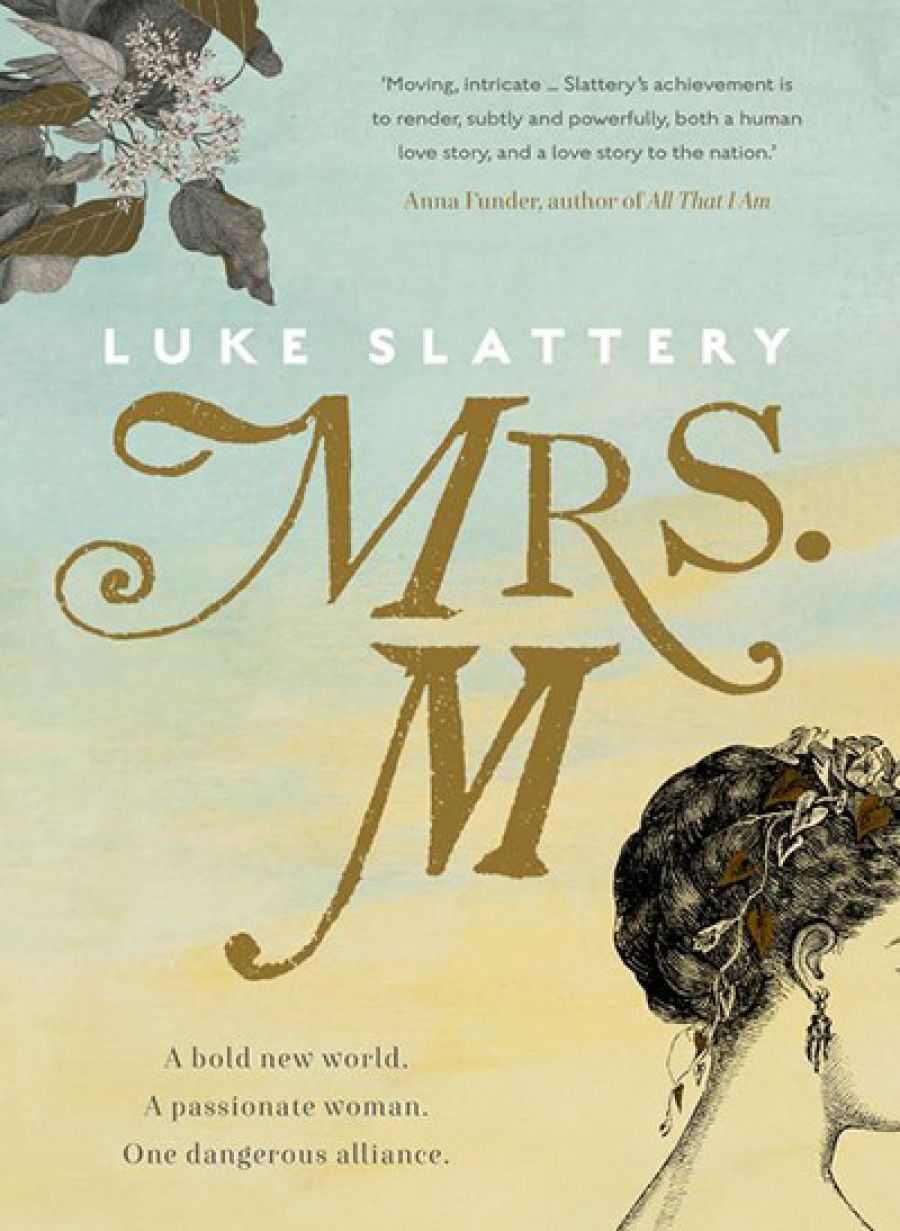
- Free Article: No
- Contents Category: Fiction
- Custom Article Title: Gillian Dooley reviews 'Mrs M: An imagined history' by Luke Slattery
- Review Article: Yes
- Online Only: No
- Custom Highlight Text:
'Mrs M’ is the second wife of Lachlan Macquarie, governor of New South Wales from 1810 to 1821. Luke Slattery explains in his Author’s Note the impulse behind his novel – Elizabeth Macquarie’s voice coming to him, romantically, in a dream. It was not quite unprompted. He had been visiting her home territory in ...
- Book 1 Title: Mrs M
- Book 1 Subtitle: An imagined history
- Book 1 Biblio: Fourth Estate, $29.99 hb, 314 pp, 9780732271817
Slattery has taken hints from the diary she kept on the voyage. Both his Elizabeth and she who penned the diary often remark approvingly on the handsome men they meet. In Slattery’s imagined version, her appreciative glance develops into the intellectual companionship – and more – that she finds with the Architect.
This Architect (never named in the novel) is a man of vision and ambition. He becomes implicated in the accusations of extravagance which cause Lachlan Macquarie’s downfall: they are allies. Elizabeth is Lachlan’s ally too. She loves her husband with the strong, calm, and loyal affection of a much younger wife who understands that she has married a still-grieving widower. There is pity mixed with her admiration. With the Architect she has a different bond. There is more to the novel than this complicated and shifting triangle of alliance and attraction, but it provides the main narrative drive.
Slattery has made the choice – call it courageous if you will – of writing this woman’s account in the first person. Elizabeth is back on the island of Mull, as a widow, and faced with the task of writing the inscription for her husband’s mausoleum through the long twilight of a Hebridean summer’s night. This scenario offers a natural opening for her reflections and recollections of her Australian adventure.
Elizabeth’s language is sometimes stiff, sometimes lyrical, inflected with a Scots rhythm reflecting her and Macquarie’s shared origins. There is an occasional anachronism: some are too trivial to mention, but I find it hard to forgive the fictional Lachlan Macquarie for his announcement that ‘our efforts will be harnessed to the completion of an ambitious building program’. (I experimentally typed that phrase into a search engine: the top three results were 2017 media releases from two Australian universities and the Scottish government.) And when Elizabeth declares to the officers gathered on the quarterdeck, ‘in the round voice of a town crier, ... Gentlemen, we have come to the Great South Land!’, I felt that we had momentarily strayed into an American courtroom drama, circa 1990.
Most of Elizabeth’s opinions are infused with the kind of progressive attitudes current in the age in which she and Lachlan lived. I suspect, though, that her sensitivity to the claims and rights of the Indigenous people goes beyond even that expressed by Nicolas Baudin and Denis Diderot. In Elizabeth’s diary, there is a paean to the institution of slavery in Cape Town, which would be out of character for Slattery’s Mrs M. There are also some improbabilities: it is intriguing that Elizabeth plays the viola, a strange choice for a solitary musician at any time. She later switches effortlessly to the cello and then the piano, and plays the intricate music of earlier centuries by memory.
 Luke Slattery
Luke Slattery
Of course, this is a work of literature, not history. Other questions need to be posed. How well does the novel create its own imaginative world? Does it orchestrate its events and encounters, its reflections and observations, into a harmonious whole? Are the characters autonomous and independent? Are the ideas tested and animated by confrontation with stubborn contingencies?
This least successful aspect of this novel is its coherence and narrative pacing. In novels where this works well, anachronisms and inconsistencies take their place as a matter of secondary concern, rather than a source of irritation and impetus for criticism. With the main imaginative focus of the novel being the reflections of Elizabeth Macquarie, a woman who has for much of the time limited agency despite her evident abilities, Mrs M too often drifts becalmed. And despite the veneer of historical fact, many of the dramatic scenes seem contrived and implausible.
On other points, Mrs M does better. We view late Georgian Sydney and its inhabitants through Elizabeth’s intelligent and usually cool eyes, while understanding that she is not an unbiased narrator. She must make difficult compromises with her principles and passions. And Slattery provides a welcome surprise at the end, allowing her to reorient her hitherto retrospective view towards a hopeful future.


Comments powered by CComment